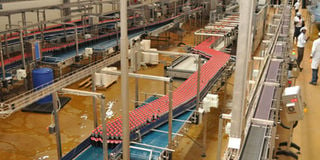The fights in Uganda’s soda business

Soda bottles go through a production line. Small players have found it difficult to survive. Photo Rachel Mabala
What you need to know:
The prices were also cut and there was no more luxury for soda companies to revise prices upwards
Between 2011 and 2012, three beverage firms launched in Uganda lifting the lid off a market that had operated like a semi-monopoly for more than three decades.
Whereas the three, including Harris International, makers of Riham, Azam and Fizzy had tossed to the momentous launch, their entry could have brought discomfort in a market that had in so many years not seen any stable competitor.
The market had last been interrupted with the collapse of Creeps in 1996, a Masaka soda production line, owned by Masaka Cooperative Union.
The collapse of Creeps and the current state of the market is a manifestation that spells out how tricky it can be to survive in a market with two humongous multinationals – Century Bottling Company, the bottlers of Coca-Cola and Crown Beverages [Pepsi].
In November 2012, Harris International launched a huge soda production line in Kawempe, Kampala. The launch must have gigged the market announcing the arrival of a new player ready to take on the bulls.
The frenzy of a new soda(s) grossed the market but was soon doused by a law suit faulting Harris International for brand infringement.
Justifying the law suit
In an email exchange on April 29, 2013, Bob Okello, the Coca Cola East Africa corporate and government relations manager, sitting in Nairobi, Kenya told Daily Monitor: “This is a matter of pure trademark infringement. Through our lawyers, we alerted the offender [Haris International] accordingly but they seemed undeterred. They left us no other recourse but to seek redress in court.”
Mr Okello was reacting to Harris International’s new soda brands - Riham Cola and Fun Time that had distinct features similar to those of some of Coca Cola brands.
The case was, according to Harris International, an interruption in its operations but could not scar its determination to take their share in the market.
Equally, Coca-Cola’s move shocked Harris International, considering that the two had been in discussion about the matter.
Alex Rezida, the then Harris International lawyer, told Daily Monitor :“My client is shocked by Coca-Cola’s [CBC] action since negotiations concerning a number of modifications had been on-going.”
The case, which had been filed on April 24, 2013, raised questions, according to Rezida, considering that the two companies had the previous day exchanged on new modifications without any fuss.
Case settled
However, the case was in November 2013 settled out of court but had indeed scarred Harris International as it had to sink huge sums of money in new brand identities and modifications.
Asked last week if they (Coca Cola] tried to keep out competition, Okello said in a brief email: “We reject those allegations.”
His view is further supported by Maureen Kyomuhendo, the Coca-Cola public affairs and communications manager, who says they cannot fight competition but can only engage it with doing their ‘homework’.
“Here at Coca-Cola, we encourage fair competition. But we cannot accept people who use unfair competition just for the sake of it,” she says.
Several efforts to engage Crown Beverages Limited, proved difficult as several officials couldn’t be reached by press time.
However, earlier in an interview Ms Maggie Kigozi, a director at Crown Beverages, strongly argued in favour of fair competition, saying small and medium sized enterprises are the engine of the economy and therefore it is unacceptable for them to be unfairly boxed out of business.
Interviewed for this article, the secretary-general of Uganda Water and Juice Manufactures Association, Morgan Bonna Gyaviira, said it is evident that the beverage industry is unfairly tilted, making it hard for smaller players to compete.
“Enforcement of fair rules across board hasn’t been effectively done yet. Industry players that are establishing themselves need protection from, among others, the mushrooming businesses most of which do not care about standards and are unwilling to invest in proper manufacturing practices.”
But Gideon Badagawa, the executive director of Uganda Private Sector Foundation advises that small players should seek partnerships instead of fighting with the ‘big boys’ who have ‘deep pockets’.
“It is difficult to beat the big brands because they are established. Borrow a leaf instead of trying to engage in a competition where there will only be one winner.”
And indeed as Badagawa says there is one winner since the three brands, which launched between 2011 and 2012 have either been boxed out by competition or are low on supply and distribution.
Whereas Riham products have a relatively strong presence in the market, they have become low on supply and are not available in some areas.
A mini survey conducted by this newspaper in the areas of Namuwongo, Muyenga, Kabalagala, Kibuli and Nsambya indicate sporadic availability of some of these products and some completely unavailable.
For instance Fizzy soda is low on supply with supermarket attendants in those areas saying supply is irregular.
Whereas we could not readily establish, Azam could have substituted its soda products with Azam Juice since it is the only product with a related name on the shelves.
The juice is manufactured in Tanzania.
The new dawn for consumers
The entry of new players brought the best fortunes for soda consumers.
Theirs was a homework that shocked the market and took company executives back to the boards.
And what came out of the boardrooms was good news to consumers with companies rebranding to usher in new innovations. The innovations came with pet bottles for all available products that almost ended the glass-bottled-sodas.
Although the glass bottles are still a feature they have since been fading off the market at great speed.
The prices were also cut and there was no more luxury for soda companies to revise prices upwards.




